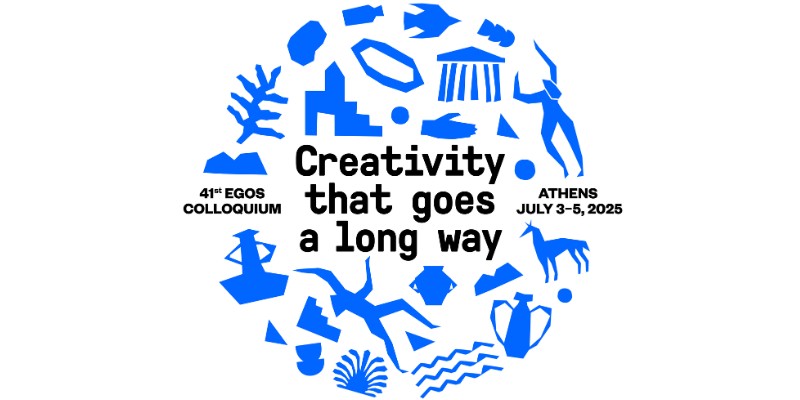Network Agency and Creativity: The Mutual Interdependence between Network Actors and Social Structures

Understanding how individuals and organizations shape—and are shaped by—their networks is a central challenge in organizational research. This call for papers invites scholars to explore the evolving interplay between agency and structure in social networks. We welcome diverse perspectives that shed light on how creative action, identity, and social dynamics emerge within and across organizational networks.
EGOS Colloquium 2025
The 41st Colloquium of the European Group for Organization Studies (EGOS) will be held in Athens from July 4 to July 5. The general theme of the colloquium is “Creativity that Goes a Long Way”.

Call for Papers
Organizational research is pervaded by tension on network agency. Networks and agency are the apparent poles of an oxymoron, in which the network identifies the set of nodes and ties that form social structure, enabling and/or constraining network participants’ (individuals, teams, organizations) choices and actions, and agency represents the extent to which actors forge, reproduce and shape macro-level (inter)organizational and social structures (Tasselli & Kilduff, 2021).
Despite the burgeoning interest in this topic, which is signalled by the increasing number of empirical (e.g., Quintane & Carnabuci; Soda et al., 2018; Tasselli & Kilduff, 2018) and review papers (e.g., Burt et al., 2013; Chen et al., 2022; Halevy et al., 2019; Ahuja et al., 2011), symposia and special issues published by leading journals in the field, there is no doubt that the study of the nuanced still contradictory connections between network participants’ action and structure deserves deeper and richer attention. On the one hand, it is now universally accepted by organizational researchers that networks are social canvases that either favour or hamper network participants’ action, but it is at the level of network actors, with their idiosyncratic attributes and behaviours, that social action originates and then diffuses in and throughout the network (e.g., Kleinbaum et al., 2015; Pallotti et al., 2023; Tasselli & Sancino, 2023). This is particularly evident when creative individual action introduces an unexpected change in the structure of the social canvas sustained by organizational social networks (Perry-Smith & Mannucci, 2017).
However, although the tension concerning agency has been prescient in social network theory and research since its very beginnings (e.g., Moreno, 1941), it has gained popularity (only) recently. Therefore, several important questions remain unanswered. These questions are both theoretically and empirically relevant and represent illustrative (although non-exhaustive) examples of the core topics that we expect to present and discuss in the proposed sub-theme.
How does networking happen? (i.e., through which processes and behaviours do actors come to occupy those structural positions that explain personal advantage and organizational effectiveness?)
How do actors change their current structural network position through innovation and creative action, and how does individual creativity diffuse, persist, and becomes a team or (inter) organizational feature?
What are the coevolutionary patterns through which individual actors and social networks mutually define each other in a dynamic process of structuration and reciprocal influence?
How do social networks shape individual identities and personalities, in a structuration approach to agency that implicitly calls for a parallel, ideographic approach to networking?
The aim of this sub-theme is to attract and involve a diverse and rich group of young and experienced researchers in an interactive set of presentations and discussions of these and other relevant questions and debates concerning network agency. The current questions and debates involve issues associated with network actors’ characteristics, agency, cognition, behaviours, and with the dynamic interplay of individual choices and structural contingencies. These ideas make the study of organizational networks relevant at different levels of analysis and represent the basis from which the study of social interactions contributes to the articulation of new theory and to the identification of new organizationally relevant phenomena.
Given the broad spectrum of our research questions, we welcome submissions at both the micro-level (e.g., intra-organizational social networks) and at the macro-level of analysis (e.g., relationships between organizations or institutions). We are particularly interested in contributions that focus on how creativity originates from – and at the same time connects – multiple levels of organizational agency. We invite papers that follow a wide range of epistemological approaches and methodologies, ranging from quantitative submissions to qualitative and meta-analytical submissions. Review and theoretical papers are also welcomed. Overall, this sub-theme calls for the investigation of how organizational actors, through their agentic or structured approaches to network patterning, model social reality, and of how in turn these actor-based or structural models interact with individual action and organizational outcomes.
References
Ahuja, G., Soda, G., & Zaheer, A. (2012): “The genesis and dynamics of organizational networks.” Organization Science, 23 (2), 434–448.
Burt, R.S., Kilduff, M., & Tasselli, S. (2013): “Social network analysis: Foundations and frontiers on advantage.” Annual Review of Psychology, 64, 527–547.
Chen, H., Mehra, A., Tasselli, S., & Borgatti, S.P. (2022): “Network dynamics and organizations: A review and research agenda.” Journal of Management, 48 (6), 1602–1660.
Halevy, N., Halali, E., & Zlatev, J.J. (2019): “Brokerage and brokering: An integrative review and organizing framework for third party influence.” Academy of Management Annals, 13 (1), 215–239.
Kleinbaum, A.M., Jordan, A.H., & Audia, P.G. (2015): “An altercentric perspective on the origins of brokerage in social networks: How perceived empathy moderates the self-monitoring effect.” Organization Science, 26 (4), 1226–1242.
Moreno, J.L. (1941): “Foundations of sociometry: An introduction.” Sociometry, 4, 15–35. Pallotti, F., Mascia, D., & Giorgio, L. (2023): “A multilevel study of social networks and collective reactions to organizational change.” Journal of Organizational Behavior, 44 (7), 1109–1128.
Perry-Smith, J.E., & Mannucci, P.V. (2017): “From creativity to innovation: The social network drivers of the four phases of the idea journey.” Academy of Management Review, 42 (1), 53–79.
Quintane, E., & Carnabuci, G. (2016): “How do brokers broker? Tertius gaudens, tertius iungens, and the temporality of structural holes.” Organization Science, 27 (6), 1343–1360.
Soda, G., Tortoriello, M., & Iorio, A. (2018): “Harvesting value from brokerage: Individual strategic orientation, structural holes, and performance.” Academy of Management Journal, 61 (3), 896–918.
Tasselli, S., & Kilduff, M. (2018): “When brokerage between friendship cliques endangers trust: A personality–network fit perspective.” Academy of Management Journal, 61(3), 802–825.
Tasselli, S., & Kilduff, M. (2021): “Network agency.” Academy of Management Annals, 15 (1), 68–110.
Tasselli, S., & Sancino, A. (2023): “Leaders’ Networking Behaviours in a Time of Crisis: A Qualitative Study on the Frontline against COVID‐19.” Journal of Management Studies, 60 (1), 120–173.
Related Posts

Research Talks
A presentation of a study showing that closed networks serve as social straitjackets that prevent employees from achieving high levels of innovative performance.

Research Talks
A presentation of a study showing that closed networks serve as social straitjackets that prevent employees from achieving high levels of innovative performance.

Research Talks

Research Talks